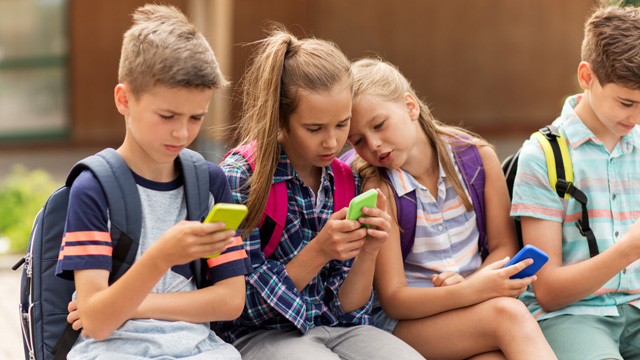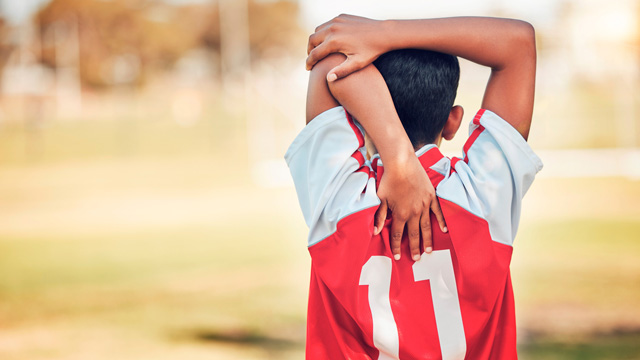Playing video games created for an older audience is a hard pass
Tweens—those changelings who seem to grow in size and maturity seemingly overnight—can be hard to read. Sure, they know how to project confidence and street smarts (thanks, internet), but they still want to cuddle and can’t pass up a dive into the doctor’s office treasure box on the way out from an appointment. Knowing when to give them some independence and when to pull the parent card isn’t as cut and dry as when they were little. But we’ve done the research, and below, you’ll find a dozen things that tweens shouldn’t do and that we’ve totally got your back on saying no to.
Be Dropped Off at a Public Venue
The reasons against dropping off your tween in a public venue that usually come to mind are different than what you might expect. Let Grow, an organization that believes in the power of enabling children to explore the world on their own, asked David Finkelhor, head of the Crimes Against Children Research Center at the University of New Hampshire, “Have you heard of any case where a child was taken from a parent in public and forced into the sex trade?” His answer—NO. Actual traffickers build relationships with young people they go on to exploit.
But when you’re an unsupervised tween with other tweens, social contagion behavior can be expected. As Dr. Jessica Baker notes, “Tweens are much more concerned with what peers think of them than with what adults think of them. When you put more of them together, if there is impulsivity, the impulsivity amongst the group tends to rise as well. This can lead to bad decisions.” This applies at home too, but in most circumstances, kids are supervised at home. When they’re dropped off, they’re tempted to exhibit new behaviors, and those behaviors will be duplicated.
Have Unchecked Social Media
We get it. First comes the computer, the tablet, or the phone because they have virtual school or use it to connect from home with friends or have late practices. But before you know it, Tic Toc, Instagram, Snapchat, and Be Real become the dominant reason your child is on the device. Research by Johns Hopkins University suggests that the more time spent on social media, the more likely your child is to experience cyberbullying, social anxiety, depression, and exposure to content that is not age-appropriate. “Tweens have shifted to a cognitive plane where they are more aware of those outside of themselves. This makes them extremely vulnerable to many parts of social media,” says clinical psychologist Jessica Baker, Ph.D., CED-S. So before opening the gate to the land of likes and shares, here are some guidelines that will help you ease into this new frontier of parenting.
Watch Mature Entertainment Content
There are a variety of ways that adult content—including sexual content, violence, or encompassing mature concepts—can impact children negatively. According to the American Academy of Pediatrics, “traditional media appears to influence youths’ “sexual scripts,” or shared societal-level beliefs about how people should act in sexual situations. The bottom line? The more sexual content kids see, the more likely they are to embrace sexual behaviors, and sooner. The more violence and aggression, the more likely they are to exhibit aggression. And exposure to adult concepts, such as family dysfunction, mature decisions, and ethical choices, needs context and conversation—two things kids are unlikely to get by just watching it on television.
Have a Smartphone with All the Apps

According to Dr. Lydia Criss Mays, Educational Consultant and Early Childhood and Elementary School Expert, “Tweens aren’t ready to own smartphones—nor should they. Recent research shows that owning a smartphone younger predicts lower self-worth, motivation, and resilience. And for tween girls with smartphones, the higher the rates of sadness, anxiety, and depression. One of the best things parents can do for their tweens’ mental health is to keep smartphones out of their hands.”
Manage Money
If you watch the headlines, you’ll probably catch something that reads “Child Charges $1.4k to Amazon.” And while the big spends are kind of funny (and fixable), access to insta-purchasing on computers and smartphones means your tweens have no stopgap between wanting something and getting it. While the convenience of Apple Pay or other automated payment services makes a run to the concession stand by your child easier on you on game day, it does nothing to help them learn how to manage money. Other apps, like Greenlight—the company that launched a parent-managed debit card and app for children to teach money management skills and has just announced Greenlight Max, the first educational investing platform designed for kids—go the extra mile to make sure your tween’s first foray into financial decision-making is instructional, as well.
Be BFFs with Older Teens
According to Angela Herzog, Ph.D., and Clinical Psychologist, tweens are often not prepared to meet the emotional needs of their parents, “who can sometimes turn a blind eye when tweens try to appear mature or socially adept.” Sometimes, when a tween acts older than their age or hangs out with older tweens or teens, it reflects positively on the social standing of the parent. These affiliations with older kids can result in the tween finding him or herself in social scenarios that they are unprepared for, such as drinking or being around sexually charged exchanges—and the tween is simply unprepared to understand the repercussions of this, particularly when parents are giving implied consent to the friendship with older kids.
Decide to Quit

Let’s face it: tweens are often a few years into a hobby or a sport or mastery of a musical instrument which may be getting just a little stale. However, in the long run, the years between ages 12 and 15 (or high school) are a sprint. Allowing your child to quit something they’ve invested in for years just before they can play or perform at the next level without at least understanding their motivations for quitting is short-sighted. If they ultimately decide to give up on something they’ve worked hard at, make sure it’s for reasons they won’t regret in a few seasons.
Wear a Full Face of Makeup
Chances are your 10-12-year-old tween is being exposed to a stream of products, tutorials, how-to’s, and “hacks” for a visual transformation. And the message they’re getting? Conform to another’s beauty standard and optimize your self-worth. According to the Cleveland Clinic, “There’s no right or wrong age, but the first rule of thumb is to have an open discussion about makeup as soon as your child expresses interest. Parents need to establish expectations, set limits, and understand the psychological and health impact of these permissions on them.”
Play Video Games Rated Teen or Mature
Similar to watching mature television content, playing video games rated teen or mature exposes tweens to images of violence, language, gender stereotyping, and sexually explicit content. Regardless of the game’s popularity, tweens have no business finding their entertainment from media developed for more mature audiences. You’re essentially serving them content they’re incapable of contextualizing, and it will in turn show up in their own behaviors.
Have a Steady Boy or Girlfriend
According to the American Academy of Pediatrics, kids start dating at an average age of 12 and a half for girls and 13 and a half for boys. But at ages 10-12, they are still developing their sense of identity, which becomes confusing when someone else’s identity is intertwined with theirs. While every child is different, most 10-12-year-olds don’t fully understand what it means to be in a relationship, how to respect other people’s boundaries, and cannot handle the emotional pressure of being in a relationship with another person.
Get Fewer Than 9-10 Hours of Sleep Per Night
The American Academy of Sleep Medicine recommends that children aged 6–12 years should regularly sleep 9–12 hours per 24 hours, and teenagers aged 13–18 should sleep 8–10 hours per 24 hours. A good night’s sleep is about getting to sleep, staying asleep, and getting enough good-quality sleep. Here is how a sleep expert establishes bedtime routines in her own home.











